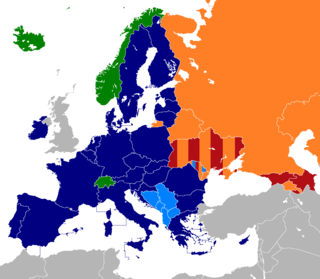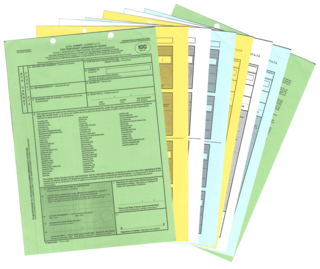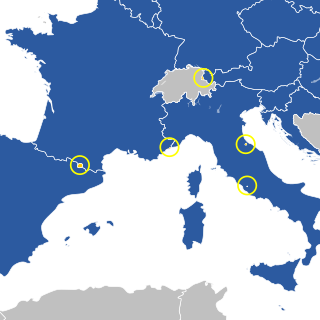Related Research Articles
A customs union is generally defined as a type of trade bloc which is composed of a free trade area with a common external tariff.

The European Free Trade Association (EFTA) is a regional trade organization and free trade area consisting of four European states: Iceland, Liechtenstein, Norway and Switzerland. The organization operates in parallel with the European Union (EU), and all four member states participate in the European single market and are part of the Schengen Area. They are not, however, party to the European Union Customs Union.
An economic and monetary union (EMU) is a type of trade bloc that features a combination of a common market, customs union, and monetary union. Established via a trade pact, an EMU constitutes the sixth of seven stages in the process of economic integration. An EMU agreement usually combines a customs union with a common market. A typical EMU establishes free trade and a common external tariff throughout its jurisdiction. It is also designed to protect freedom in the movement of goods, services, and people. This arrangement is distinct from a monetary union, which does not usually involve a common market. As with the economic and monetary union established among the 27 member states of the European Union (EU), an EMU may affect different parts of its jurisdiction in different ways. Some areas are subject to separate customs regulations from other areas subject to the EMU. These various arrangements may be established in a formal agreement, or they may exist on a de facto basis. For example, not all EU member states use the Euro established by its currency union, and not all EU member states are part of the Schengen Area. Some EU members participate in both unions, and some in neither.

The economy of Liechtenstein is based on industry, with a small but significant agricultural sector, and services. The country participates in a customs union with Switzerland and uses the Swiss franc as its national currency. It imports more than 85% of its energy requirements. Liechtenstein has been a member of the European Free Trade Association (EFTA) since 1991. It also has been a member of the European Economic Area (EEA) since May 1995 and participates in the Schengen Agreement for passport-free intra-European travel.

Customs is an authority or agency in a country responsible for collecting tariffs and for controlling the flow of goods, including animals, transports, personal effects, and hazardous items, into and out of a country. Traditionally, customs has been considered as the fiscal subject that charges customs duties and other taxes on import and export. In recent decades, the views on the functions of customs have considerably expanded and now covers three basic issues: taxation, security, and trade facilitation.

The special territories of members of the European Economic Area (EEA) are the 32 special territories of EU member states and EFTA member states which, for historical, geographical, or political reasons, enjoy special status within or outside the European Union and the European Free Trade Association.
The Caribbean Basin Trade Partnership Act (CBTPA) is a law adopted by the U.S. Government in October 2000 to delineate enhanced trade preferences and eligibility requirements for the 24 beneficiary countries of the Caribbean Basin region.

At present, there are six multi-lateral free trade areas in Europe, and one former free trade area in recent history. Note that there are also a number of bilateral free trade agreements between states and between trade blocks; and that some states participate in more than one free trade area.
Economic integration is the unification of economic policies between different states, through the partial or full abolition of tariff and non-tariff restrictions on trade.
An employers' organization or employers' association is a collective organization of manufacturers, retailers, or other employers of wage labor. Employers' organizations seek to coordinate the behavior of their member companies in matters of mutual interest, such as during negotiations with trade unions or government bodies. Employers' organizations operate like trade unions and promote the economic and social interests of its member organisations.

The Swiss Trade Union Federation is the largest national trade union center in Switzerland.

The ATA Carnet, often referred to as the "Passport for goods", is an international customs document that permits the tax-free and duty-free temporary export and import of nonperishable goods for up to one year. It consists of unified customs declaration forms which are prepared ready to use at every border crossing point. It is a globally accepted guarantee for customs duties and taxes which can replace the security deposit required by each customs authority. It can be used in multiple countries in multiple trips up to its one-year validity. The acronym ATA is a combination of French and English terms "Admission Temporaire/Temporary Admission". The ATA carnet is now the document most widely used by the business community for international operations involving temporary admission of goods.

Currently, all of the European microstates have some form of relations with the European Union (EU).

The European Union Customs Union (EUCU), formally known as the Community Customs Union, is a customs union which consists of all the member states of the European Union (EU), Monaco, and the British Overseas Territory of Akrotiri and Dhekelia. Some detached territories of EU states do not participate in the customs union, usually as a result of their geographic separation. In addition to the EUCU, the EU is in customs unions with Andorra, San Marino and Turkey, through separate bilateral agreements.

The Arab Customs Union is a customs union announced at the Arab League's 2009 Arab Economic and Social Development Summit in Kuwait in order to achieve a functional customs union by 2015 and an Arab common market by 2020 and to increase inter-Arab trade and integration.

Diplomatic and economic relations between Switzerland and Liechtenstein have been close, with Switzerland accepting the role of safeguarding the interests of its smaller neighbour, Liechtenstein. Liechtenstein has an embassy in Bern. Switzerland is accredited to Liechtenstein from its Federal Department of Foreign Affairs in Berne and maintains an honorary consulate in Vaduz.
The World Movement of Christian Workers is the Catholic Church's officially recognized association for Catholic workingmen and women. It is a member organization of Vatican's Conference of International Catholic Organizations. The World Movement of Christian Workers (WMCW/MMTC) does not have individual members but is a federation of various national movements. The organization in the United States is the Catholic Labor Network. In the UK, it is the Movement of Christian Workers.
The Union of Swiss Postal, Telegraph and Telephone Personnel was a trade union representing communication workers in Switzerland.
The Union of Swiss Postal Employees was a trade union representing office staff of Swiss Post.
The Swiss Musicians' Union is a trade union representing musicians in Switzerland.
References
- ↑ "Gewerkschaft Garanto". Schweizerisches Sozialarchiv. Retrieved 15 December 2020.
- ↑ Mitchell, James P. (1955). Directory of Labor Organizations: Europe. Washington DC: United States Department of Labor. pp. 28.16–28.24.